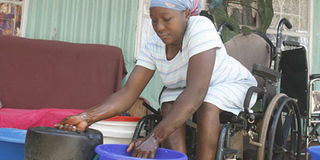Unpaid care derailing women’s progress, says UN report

A woman doing household chores. UNCTAD is concerned that time constraints are imposing a double burden on women. PHOTO | FILE | NATION MEDIA GROUP
What you need to know:
- Ms Ojweke starts her day at 3am to pick supplies and open shop by 4am.
- In Tanzania, women spend 3.5 times more minutes per day on unpaid care and domestic work than men.
- UNCTAD recommends creation of gender sensitive trade and employment policies.
On a typical day, Ms Margaret Nabeto, a farmer in Nessuit, Nakuru County, spends an hour to complete her domestic chores before engaging in any income-generating activity.
“I wake up at 6am every day to ensure I have cleaned the dishes and house and put everything in order by at least 7am before I embark on my farm work. I then milk my cows and deliver to buyers before I get back home to prepare breakfast for my family,” she says.
Kilometres away, the story is no different for Ms Hilda Ojweke, a florist in Nairobi.
In a somewhat reverse schedule from that of Ms Nabeto, Ms Ojweke starts her day at 3am to pick supplies and open shop by 4am because of the perishability of her commodities.
HOUSEHOLD CHORES
She stays on until 6pm and as soon as she is home, she engages in household chores before retiring at midnight.
Ms Nabeto and Ms Ojweke are a manifestation of how women utilise their time and how this directly contributes to gender inequalities in economic productivity.
United Nations Conference on Trade and Development (UNCTAD) is concerned that time constraints are imposing a double burden on women thereby pulling them away from taking advantage of opportunities generated by trade liberalisation and regional integration in the East African region.
“Women’s unpaid care and domestic work burden limits the number of hours they can devote to productive on-farm and off-farm activities, constrains their mobility and limits their access to market resources and information, in comparison to men,” states the UN entity in its East African Community Regional Integration: Trade and Gender Implications for 2018.
Unpaid care
For example, in Tanzania, women spend 3.5 times more minutes per day on unpaid care and domestic work than men.
It is three times more minutes per day for women in Rwanda.
Uganda exhibits a more egalitarian picture with women spending 1.2 times more minutes per day on unpaid work than men.
To eliminate this inhibiting factor, UNCTAD recommends creation of gender sensitive trade and employment policies to help women close this gap in time-use patterns.
One way would be implementing Sustainable Development Goals (SDGs) in a gender-sensitive manner.
SDGs
SDGs 1 and 2 which relate to ending poverty and hunger by 2030, are interlinked in terms of access to economic resources, basic services, land, technology and finance thus the East Africa states must address the obstacles faced by women therein to achieve gender equality, it advises.
“Gender-sensitive implementation of SDGs 1 and 2 would include increasing the female share of landholding and immovable property, bank or saving accounts, and permanent, managerial and professional jobs, as well as decreasing the female share of informal employment,” adds UNCTAD
Dr Agnes Abuom, a gender expert notes that the importance of counties investing in public day-care services for the rural women to untie their time to childcare.
“Men don’t bear the burden of raising children as women do. Unfortunately it takes their time away from productive work and county governments can help them by setting up day-care centres run by professionals,” she says.





